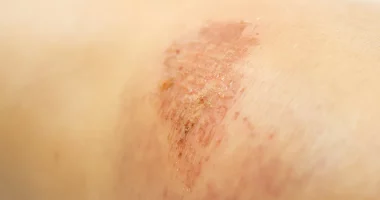Beriberi is a health problem that happens when someone doesn’t get enough thiamine, also known as vitamin B-1. When the body is very low on this vitamin, it can cause serious and long-lasting harm to the nerves and heart.
The name “beriberi” comes from a Sinhalese word that means “extreme weakness.” This makes sense because the condition can cause very severe and even dangerous symptoms that can be life-threatening.
What is Beriberi?
Beriberi is a serious condition that can be life-threatening. It happens when a person doesn’t have enough thiamine, which is also called vitamin B-1.
Thiamine is a vital nutrient that we get from our food. It helps the body do many important things, including:
- Breaking down carbohydrates from food into energy
- Helping muscles contract properly
- Allowing nerve cells to send signals
- Creating glucose, which is a type of sugar the body uses for energy
- Making acids that aid in digestion
If the body doesn’t have enough thiamine, it can’t do these things well, leading to serious health problems.
One of the dangers of beriberi is that the body’s thiamine levels can drop quickly. For someone who isn’t getting enough thiamine, it can take just 2 to 3 weeks for their thiamine stores to run out.
There are two main types of beriberi:
- Wet beriberi: This type affects the heart and blood vessels. It can cause poor circulation and cause fluid production in the body’s tissues.
- Dry beriberi: This type affects the nerves. It often starts in the legs and arms, causing the nerves to deteriorate. This can lead to muscle weakness and hyporeflexia.
Causes of Beriberi
Beriberi happens mainly for two reasons. One is not getting enough thiamine (vitamin B-1) from the diet another is the body having trouble processing thiamine.
In developed countries like the United States, beriberi is rare. This is because many everyday foods, such as cereals and bread, are contained with thiamine. Consuming these foods usually provides enough thiamine to prevent a deficiency.
However, in places where these fortified foods are available, the actual cause of beriberi is alcohol use disease. According to the Department of Health & Human Services, about 80% of individuals who consume alcohol will grow a thiamine deficiency. This is because alcohol interferes with the body’s ability to process and absorb thiamine properly.
Babies can also get beriberi if the milk from their mother they drink doesn’t have enough thiamine or if they are fed formula that lacks this vitamin.
There is also an uncommon condition called genetic beriberi. This condition is not related to diet but instead is due to a genetic problem that prevents the body from absorbing thiamine from food.
Certain groups of people are more likely to develop beriberi, including:
- Older adults
- Individuals with diabetes
- Individuals with HIV
- Individuals who have had weight-loss surgery (bariatric surgery)
These groups are at higher risk because their bodies may have more difficulty processing thiamine or they may have other health conditions that affect their nutritional needs.
Symptoms
Beriberi symptoms can differ depending on whether it is wet beriberi or dry beriberi.
Wet Beriberi
Symptoms of wet beriberi include an increased heart rate, lack of stamina or continuous tiredness, and shortness of breath. Some people may wake up at night because they are short of breath. Additionally, there can be inflammation in the legs and feet.
Dry Beriberi
Symptoms of dry beriberi include body aches general pain, vomiting, and trouble in walking. It can also cause confusion, numbness in the feet or hands, and paralysis in the lower legs.
Wernicke-Korsakoff Syndrome
In uncommon, extreme cases of thiamine deficiency, beriberi can lead to a condition called Wernicke-Korsakoff syndrome, a type of brain damage. An individual with Wernicke-Korsakoff syndrome may face loss of memory or an inability to create new memories, confusion, rapid or involuntary eye movements, double or blurred vision, hallucinations, and lack of muscle coordination.
Diagnosis of Beriberi
To diagnose beriberi, doctors use urine and blood tests to check the levels of thiamine (vitamin B-1) in a person’s body. These tests help determine if there is a deficiency.
Doctors also perform physical tests to look for signs of nerve damage and heart problems. Signs of nerve damage might include difficulty balancing or walking, poor coordination, and weak reflexes.
The healthcare provider will also measure the person’s breathing rate and heart rate. They will look for inflammation in the lower legs and feet, which can be a sign of heart issues.
Treatment of Beriberi
The main goal of treating beriberi is to improve the levels of thiamine (vitamin B-1) in the body. To do this, doctors might recommend taking thiamine supplements either by mouth or through injections, depending on the individual’s overall health. They may also recommend other supplements to help with the treatment.
Doctors will usually do regular blood examinations during treatment to monitor the person’s thiamine levels and make sure they are back to normal. After treatment, a person might need to continue consuming thiamine supplements at a lower dose or change their diet to prevent beriberi from coming back.
In addition to treating the thiamine deficiency, doctors will also address any complications caused by beriberi, such as heart or nerve damage.
If beriberi is treated early, the damage to the nervous system and heart can often be reversed. However, if the deficiency has been present for a longer time, a few symptoms might persist even after medication.
Prevention of Beriberi
To prevent beriberi, it is important to get enough thiamine (vitamin B-1) in your diet.
Generally, if you eat a healthy and balanced diet that includes whole foods, you shouldn’t have to be anxious about a thiamine deficiency. Sources of thiamine found naturally in food:
- Meat: such as pork and beef
- Nuts and seeds: like sunflower seeds and macadamia nuts
- Beans and legumes: such as lentils and black beans
- Seafood: like tuna and salmon
- Dairy products: such as milk and yogurt
Additionally, many foods are fortified with thiamine, meaning that manufacturers add the vitamin to them. These include breakfast cereals, bread, and baked goods.
According to the Department of Health and Human Services, eating fortified bread and cereals is the most usual way for individuals in the U.S. to get their suggested daily amount of thiamine.
Certain groups need to be especially mindful of their thiamine intake:
- Pregnant and breastfeeding women: They should ensure they are getting enough thiamine for both themselves and their baby.
- Infants on the formula: Caregivers should check that the formula contains sufficient thiamine.
Heavy alcohol consumption increases the chance of developing beriberi because alcohol makes it harder for the body to absorb thiamine. To reduce this risk, drinking less alcohol can help. People who drink a lot of alcohol might also consider taking a vitamin B-1 supplement or a vitamin B complex supplement to ensure they are getting enough thiamine.
Outlook for Beriberi
If you experience symptoms of beriberi, it is important to see a healthcare provider as soon as possible.
Without medication, it can be very dangerous and potentially life-threatening because it can lead to heart damage or severe nerve damage.
With medication, the outlook for individuals with beriberi improves significantly. Early intervention can often reverse damage to the nervous system and heart. However, even after successful treatment, some individuals may continue to experience long-term symptoms.
If Beriberi progresses to Wernicke-Korsakoff syndrome, the outlook is less favorable. This condition causes brain damage that is usually permanent, leading to serious and lasting health problems.
The best way to avoid beriberi is through prevention, which starts with a healthy, balanced diet. Eating foods fortified with thiamine, such as bread and cereals, can greatly reduce the risk of developing beriberi. Ensuring a sufficient intake of thiamine through diet or supplements is crucial for maintaining good health.
Summary
Beriberi is a serious condition caused by a deficiency of thiamine (vitamin B-1), leading to heart and nerve damage. It is rare in developed countries due to fortified foods. Symptoms vary between wet beriberi (affecting the cardiovascular system) and dry beriberi (affecting the nervous system).
Diagnosis involves blood and urine tests, while treatment focuses on increasing thiamine levels through supplements. Prevention includes a balanced diet rich in thiamine and reducing alcohol intake. Early treatment improves the outlook, but severe cases can cause permanent damage, particularly if it leads to Wernicke-Korsakoff syndrome.
External links









